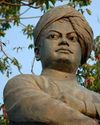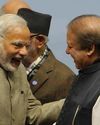Will quantum computers push man up towards his eventual union with the transcendent omniscience that some refer to as Brahman?

QUANTUM MECHANICS IS a subject that has the strange property of simultaneously being logically rigorous and yet completely counter-intuitive. So much so, that even a towering intellect like Einstein could never bring himself to accept its principles even though products based on the same exist all around us. The earliest oddity, identified by Schrodinger, one of the founders of quantum mechanics, is about a hypothetical cat that is neither dead nor alive until someone actually observes it. A similar oddity is that of quantum entanglement, where the behaviour of one particle is instantly affected by the behaviour of another particle, however distant it may be—an example of “spooky” action-at-a-distance. Explaining these phenomena is beyond the scope and temerity of this article and so the reader would have to accept them here in good, almost religious, faith and carry on with the belief that such phenomena have been observed and explained by scientists under the most rigorous experimental circumstances.
Any programmable digital computer that we use—the desktop, the smartphone or the ones at Google—is based on a finite state machine (FSM). It can, at any instant of time, be in one of a large, but finite, number of well defined states. The state of an FSM is defined by the value stored in each of its memory locations and we know that these can either be 0 or 1. So an FSM with, say, 16 bits of memory could in principle be in any one of 216 states. Any instruction to the FSM changes the value of one or more bits and the FSM moves to a different state. An FSM along with the ability to read binary input, from an infinite tape, and write back on the same tape, is the Turing machine that is the theoretical basis of any modern computer.
This story is from the June 2017 edition of Swarajya Mag.
Start your 7-day Magzter GOLD free trial to access thousands of curated premium stories, and 9,000+ magazines and newspapers.
Already a subscriber ? Sign In
This story is from the June 2017 edition of Swarajya Mag.
Start your 7-day Magzter GOLD free trial to access thousands of curated premium stories, and 9,000+ magazines and newspapers.
Already a subscriber? Sign In

Refuging Progess
There is a well-orchestrated global conspiracy to deny scientific and technological developments from the West to Third World countries.

The Monk Of Science
Vivekananda believed that Religion should be subjected to scientific methods of investigation. The third and concluding part of our series on the Swami and his views on science.
The Next Step
Indian technical manpower can be trained for high-value-added emerging services in the era of mass commoditisation of hardware.
The Threat Of Autarchy
The force of globalisation is an irreversible reality, and it is countries like India and China that will nurture it going forward.

Neanderthals: The Womb Of Caves
Recent discoveries indicate that Neanderthals may have had a rich inner life, including symbolic thought. Indeed, they may have been the progenitors of human religions.

Getting India's World Right
Incremental concessions will get India nowhere with Pakistan and China. What we need is a classically conservative foreign policy, based on realism.

The Hesitant Orbit
In order to march boldly ahead into the deep space, New Delhi must work towards building a station, boost its techno-economic planning and use the Indian Space Research Organisation smartly.

Nudges And Narratives
The debate surrounding Sanjay Leela Bhansali’s Padmavati brings India a complex network of portraits within a cultural world-system.

The Spell Of Specialisation
THE INDIAN ADMINISTRATIVE SERVICE NEEDS AN URGENT REJIG. THE KEY TO SPEED AND EFFICIENCY LIES IN PUTTING AN END TO A GENERALIST APPROACH AND IN GOING FOR A NEW SERVICE.
The Great Gamble
With demonetisation, the prime minister has taken a huge risk— both economic and political. He must succeed, because this move could transform both our economy and our society.